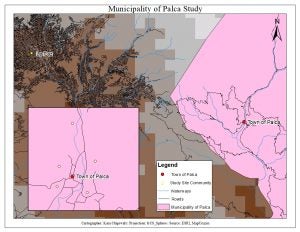I am interested in researching marginalization of women in Andean farming communities in South America for my final paper. This week I am focusing on researching the types of marginalization that exist for Andean farming women in Bolivia. I am also interested in understanding the roles of local government in their marginalization.

To better understand marginalization in general for Andean farming communities in Bolivia, I utilized an article written by Julia McDowell and Jeremy Hess titled Accessing adaptation: Multiple stressors on livelihoods in the Bolivian highlands under a changing climate (2012).
The Municipality of Palca in the Bolivian Andes comprises many indigenous farming communities along the Choquecota River Basin. Located 12 miles southeast of La Paz, the capital of Bolivia, Palca is home to both Spanish and Aymara speaking communities.
Unfortunately, there is a “long history” of marginalization against indigenous communities in Bolivia (p. 347). Indigenous farming communities are faced with social stressors such as governmental exclusion, unequal education opportunities, and access to resources.
Over the years, Bolivian bureaucracy has neglected to provide community members with proper identification information and “land titles,” which prohibits them from acquiring help from banks or have access to certain assistance (p. 347). Likewise, education in rural Palca is inadequate, providing less resources and curriculum. Community members also describe a lack of infrastructure access, which included help fixing “washed-out roads and bridges, collapsing irrigation canals, and patchy provision of drinking water to the misuse of funds” (p. 347). Although those stressors affect the whole community, women are especially stressed as that marginalization leads to the heads of their households, the men of the family, to migrate to seek “off-farm” income, leaving them attending to the farms (p. 347).
One issue that arises causing further stress is the lack of access to water resources. The communities in the Municipality of Palca rely on water runoff from the Mururata Glacier, which has dwindled due to climate change. The marginalization of these communities causing lack of access to resources has caused farmers to attempt adaptive strategies, including changing planting methods. However, changing planting methods “exposes” the farmers to low market prices (p. 348). Issues such as these further stress the women in charge of family farms.
Citation: McDowell, J. Z., Hess, J. J. (2012). Accessing adaptation: Multiple stressors on livelihoods in the Bolivian highlands under a changing climate. Global Environmental Change 22: 342-352. Retrieved from Scopus.